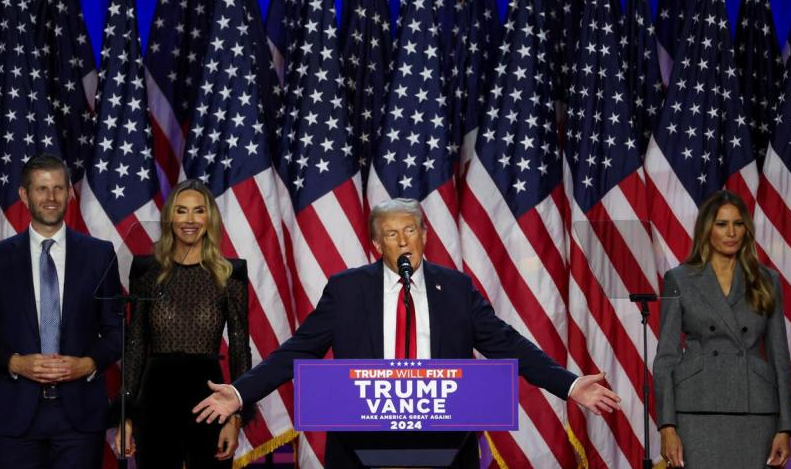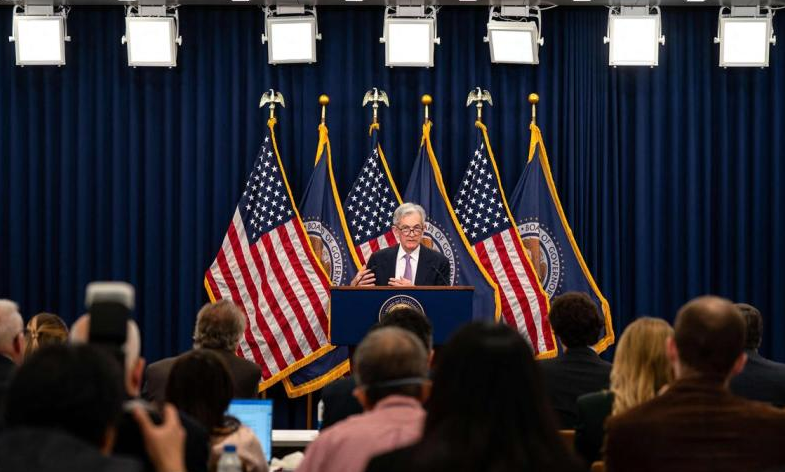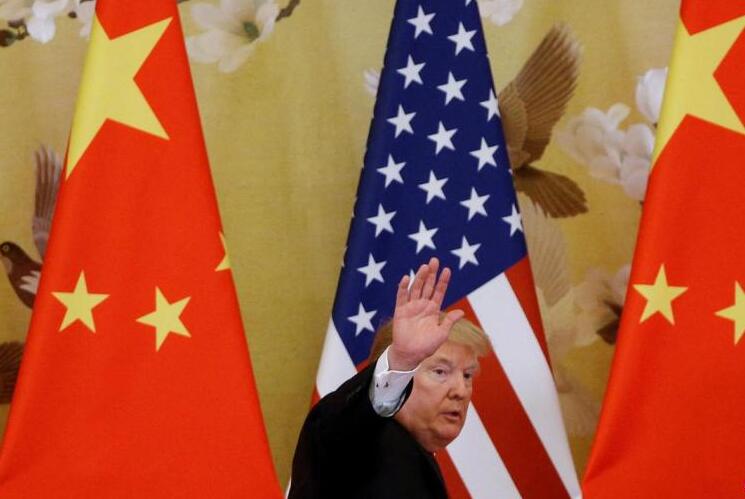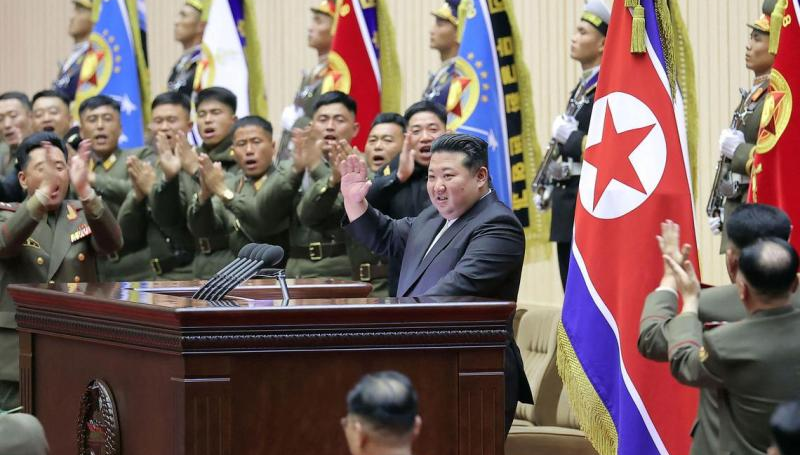
Recently, the American stock market has experienced a wave of “Trump trades,” leading to an overall increase in market valuation. Nvidia’s market value has exceeded $3.5 trillion (approximately $4.6 trillion SGD). The term “Trump trade” does not have a defined definition, but it generally refers to market trends and investor behavior influenced by Trump’s economic policies and political actions during his tenure. This phenomenon was particularly prominent after his election in November 2016, when the market reacted to his promises of deregulation, tax cuts, and increased infrastructure spending. The “Trump trade” reflects the market’s expectations of a pro-business environment.
Wall Street insiders generally believe that a victory by former President Trump is favorable for the market, while a victory by Vice President Harris would have the opposite effect. During Trump’s first term, U.S. Treasury yields rose, the U.S. dollar strengthened, and the stock market soared, especially in the technology and financial sectors. The stock market often has foresight and can predict trends in advance. With only a few days left until the November presidential election, investors are anticipating his victory. On the platform Polymarket, which is not open to Americans, a contract betting on Trump’s victory was priced at around 60 cents on October 18, while a contract betting on Harris’s victory was around 40 cents. Wall Street insiders are hoping to profit from a Trump victory.
On October 18th, a Gallup poll found that 52% of Americans believe that they and their families are worse off now than four years ago, while another 39% feel that their living conditions have improved. The responses varied based on the political affiliation of the respondents. The survey revealed that about 72% of Democrats believe that their situation is better this year compared to 2020. This number is much lower for independents at 35% and Republicans at 7%. Gallup pointed out that when asked about the most important issues in the upcoming election, respondents listed the economy and immigration, each accounting for 21%.
From an economic perspective, American voters tend to favor Trump over Biden. However, statistical data shows that Biden’s economic performance is not lacking. During Trump’s first three years in office, the GDP performed well, but it was severely impacted by the COVID-19 pandemic. Biden’s term has seen a better GDP performance. Over Trump’s four-year term, the U.S. GDP grew by 7.6%, while under Biden’s tenure up to now, the U.S. GDP has grown by 11.8%. Despite the strong GDP growth under Biden, the inflation data is quite poor. Trump’s administration saw strong growth in household income in the first three years, but a decline in the final year due to the pandemic. During Biden’s administration, inflation has significantly affected American household income. By last year, the median real income had only increased by 1.3% compared to 2020.
Looking solely at economic indicators, the economic performance of the Biden administration is comparable to or even better than Trump’s four years in office, yet Americans do not acknowledge Biden’s economic performance. Americans commonly complain about inflation, but the primary causes of inflation are not attributed to the Biden administration; interruptions in the global supply chain due to the pandemic and the Russia-Ukraine conflict play a dominant role in inflation. In September, the U.S. Consumer Price Index rose by 2.4% year-on-year, with an additional 254,000 new jobs created. The data proves that post-pandemic, the U.S. economic recovery is among the most outstanding among the major global economies, with America’s relative strength perhaps being the strongest since the turn of the century.
Even with such a bright economic report card, why can’t this be attributed to the Biden administration? In fact, the performance of the U.S. economy is not heavily reliant on the government in power. The U.S. president has limited control over the economy. Firstly, federal government spending accounts for a relatively small portion of the economy. Secondly, the majority of government spending goes towards welfare programs. Thirdly, the president represents only one branch of the government, with the primary “purse power” resting with Congress. Fourthly, government policies do not yield immediate results. Fifthly, interest rate decisions are made by the Federal Reserve rather than the president.
However, Americans tend to blame the ruling authorities for any dissatisfaction in their lives. The perplexing phenomenon is that while the Biden administration’s economic performance is strong, it does not receive widespread recognition. The key lies in the different perspectives on the issue; economists discuss the economy based on economic indicators, while general voters measure economic well-being more from personal experiences, such as the ease of meeting basic needs in their families. Research by the nonpartisan company PerryUndem shows that when voters discuss the economy, they more intuitively consider whether they are better off or worse off than four years ago, with a significant portion related to living expenses such as grocery store and gas prices, housing costs, and education fees. Voters who recognize Trump’s economic performance believe that he has performed better economically than Biden. Meanwhile, Democratic supporters, while critical of Biden’s economic performance, still prefer to vote for Harris.
This raises another question: voters’ values determine that even if Democratic supporters acknowledge Trump’s strong economic performance, they still prefer not to vote for him. Research in social psychology shows that personal values influence voting choices. Personal values are regulated by social and political values, which in turn influence voting behavior. The differences between Democrats and Republicans in welfare policies reflect starkly different positions on government intervention, personal responsibility, economic fairness, and policy priorities.
These differences in position are rooted in value discrepancies. Democrats believe that the government plays a crucial role in alleviating the difficulties of people’s lives. Trump, on the other hand, tends to emphasize the Tax Cuts and Jobs Act he implemented in 2017, claiming that this tax reduction policy drove economic growth in the U.S., reducing the poverty rate to a historic low before the pandemic. Trump has promised to extend these tax reduction policies if re-elected, and has pledged to cut various social welfare programs including healthcare subsidies and food stamps.
The Democrats advocate for big government, while the Republicans advocate for small government, with the former having socialist tendencies and the latter representing traditional conservatism. The choice between Harris, who has socialist tendencies, and Trump, who represents traditional conservatism, depends on the values of American voters.
Immigration is a weak spot for Harris. On the night of October 16th, Harris appeared on Fox News with chief political anchor Bret Baier for a 30-minute interview. She was questioned very awkwardly on immigration issues by Baier, as she did not manage the U.S. border well in her position as Vice President, leading to a large influx of illegal immigrants into the country. A survey by Pew in mid-October found that Trump has an advantage on immigration issues, with 54% of respondents believing he is most capable of handling American immigration issues. Trump’s advantage on the most important economic and immigration issues adds weight to his re-election as President of the United States.
The author is a current affairs commentator from Shanghai, China.







